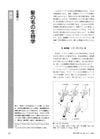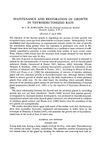 12 citations,
September 2017 in “Molecular and Cellular Endocrinology”
12 citations,
September 2017 in “Molecular and Cellular Endocrinology” Testosterone significantly affects sexual desire in both men and women, but its impact on women is more complex and influenced by psychological factors.
 March 2023 in “European journal of internal medicine”
March 2023 in “European journal of internal medicine” The patient's long-term symptoms were due to Sheehan's syndrome, which improved with hormone therapy.
 October 2023 in “Journal of the Endocrine Society”
October 2023 in “Journal of the Endocrine Society” A woman's cyclic Cushing syndrome was caused by a tumor in her adrenal gland that produced ACTH.
 15 citations,
August 2021 in “Reviews in endocrine and metabolic disorders”
15 citations,
August 2021 in “Reviews in endocrine and metabolic disorders” COVID-19 and hypopituitarism (reduced pituitary gland function) are linked, with the latter's related health issues potentially worsening COVID-19 outcomes, and COVID-19 possibly increasing risk for pituitary complications.
2 citations,
July 2021 in “Journal of feline medicine and surgery open reports” A diabetic cat with another gland issue got better after treatment with cabergoline, no longer needing insulin.
 January 1998 in “KAGAKU TO SEIBUTSU”
January 1998 in “KAGAKU TO SEIBUTSU” The document suggests that male hormones likely affect hair growth and baldness, and future treatments might involve stem cells and androgen-independent cells.
 46 citations,
November 1997 in “Journal of Neural Transmission”
46 citations,
November 1997 in “Journal of Neural Transmission” Seborrhea in Parkinson's disease may be linked to hormones, not autonomic impairment.
 78 citations,
November 2008 in “Fertility and Sterility”
78 citations,
November 2008 in “Fertility and Sterility” Amenorrhea is relatively rare and initial testing should check FSH, TSH, and prolactin levels.
 8 citations,
March 1942 in “Journal of Endocrinology”
8 citations,
March 1942 in “Journal of Endocrinology” Thyroid hormone treatments help thyroidectomized rats grow normally.
 28 citations,
March 1942 in “Journal of Endocrinology”
28 citations,
March 1942 in “Journal of Endocrinology” Male rats grow hair faster than females, and certain hormones can slow or slightly increase hair growth, but not significantly beyond natural rates.
April 2020 in “Journal of the Endocrine Society” Taking thyroid medication reduced the patient's pituitary gland swelling and improved her symptoms.
 October 2023 in “Journal of the Endocrine Society”
October 2023 in “Journal of the Endocrine Society” A woman was diagnosed with Sheehan's syndrome and a rare complication of diabetes insipidus 33 years after symptoms began, improving with hormone therapy.
 October 2023 in “Journal of the Endocrine Society”
October 2023 in “Journal of the Endocrine Society” The desmopressin stimulation test helped identify an adrenal cause for a patient's Cushing's syndrome.
 30 citations,
July 2004 in “Fertility and Sterility”
30 citations,
July 2004 in “Fertility and Sterility” Amenorrhea is when a woman doesn't have periods, with primary amenorrhea starting by age 15 or within five years of breast development, and secondary amenorrhea when periods stop for three months. It affects 3-4% of women not pregnant, breastfeeding, or in menopause, mainly due to polycystic ovary syndrome, hypothalamic amenorrhea, hyperprolactinemia, and ovarian failure.
 1 citations,
January 2018 in “Pediatrics in review”
1 citations,
January 2018 in “Pediatrics in review” A 7-year-old boy with a brain tumor developed early puberty, which was successfully treated with medication.
 October 2010 in “Reproductive Biomedicine Online”
October 2010 in “Reproductive Biomedicine Online” Women with pituitary adenomas often have reproductive issues, like irregular periods and trouble getting pregnant, but not always breast milk production without pregnancy.
April 2020 in “Journal of the Endocrine Society” The patient with a misplaced pituitary gland and interrupted pituitary stalk is being treated with hormone replacement.
 2 citations,
June 1980 in “International Journal of Dermatology”
2 citations,
June 1980 in “International Journal of Dermatology” Scalp biopsies are important for diagnosing hair loss conditions.
 18 citations,
January 2004 in “Dermatologic Clinics”
18 citations,
January 2004 in “Dermatologic Clinics” Skin problems in older people can indicate hormonal diseases, nutritional deficiencies, or conditions like diabetes, menopause, and HIV.
May 2022 in “The Journal of Clinical Pharmacology” Metformin reduces certain hormone levels in men with early-onset hair loss.
 55 citations,
July 1999 in “Clinics in Sports Medicine”
55 citations,
July 1999 in “Clinics in Sports Medicine” Athletes use steroids to enhance performance despite health risks and legal issues, and education on their dangers is needed.
The chapter explains causes of hair loss and excessive hair growth in animals.
 7 citations,
February 2018 in “Australian Prescriber”
7 citations,
February 2018 in “Australian Prescriber” Some sports supplements can cause health issues like mood swings, hair loss, and heart problems in men.
 14 citations,
January 2018 in “Endocrine”
14 citations,
January 2018 in “Endocrine” Cantú syndrome may be linked to pituitary adenomas.
 January 2018 in “Karger Kompass”
January 2018 in “Karger Kompass” Skin symptoms like fragile skin and easy bruising can indicate Cushing's syndrome, which requires early diagnosis and treatment to prevent serious health issues.
 4 citations,
August 2017 in “The Nurse Practitioner”
4 citations,
August 2017 in “The Nurse Practitioner” Secondary amenorrhea has many causes and requires thorough evaluation to treat and restore menstrual cycles.
1 citations,
June 2022 in “Frontiers in Neuroanatomy” Early hormones shape sex-specific differences in rat glands.
 6 citations,
February 2017 in “Case Reports in Dermatology”
6 citations,
February 2017 in “Case Reports in Dermatology” Hair loss led to the diagnosis of Cushing's disease in a patient, showing that hair loss can be a sign of hormonal disorders.
20 citations,
June 1985 in “Toxicologic Pathology” Some steroid-induced health issues in rodents improved after stopping treatment, but hair loss and eye problems did not.
36 citations,
June 2003 in “The journal of small animal practice/Journal of small animal practice” Trilostane helped a cat with a hormone issue but the cat later died from a kidney infection.






















